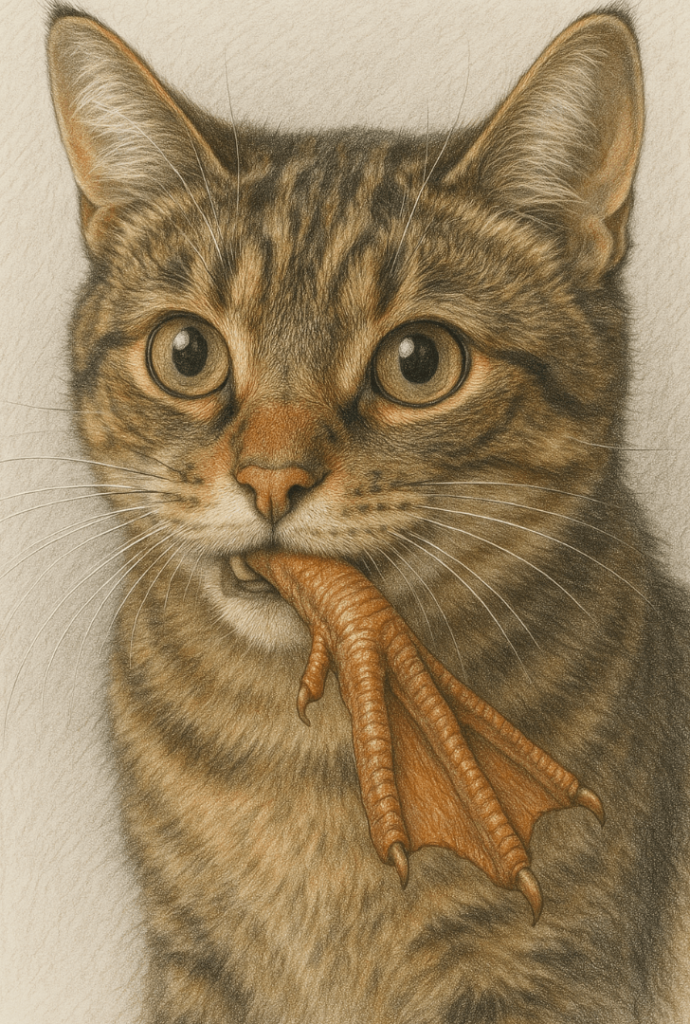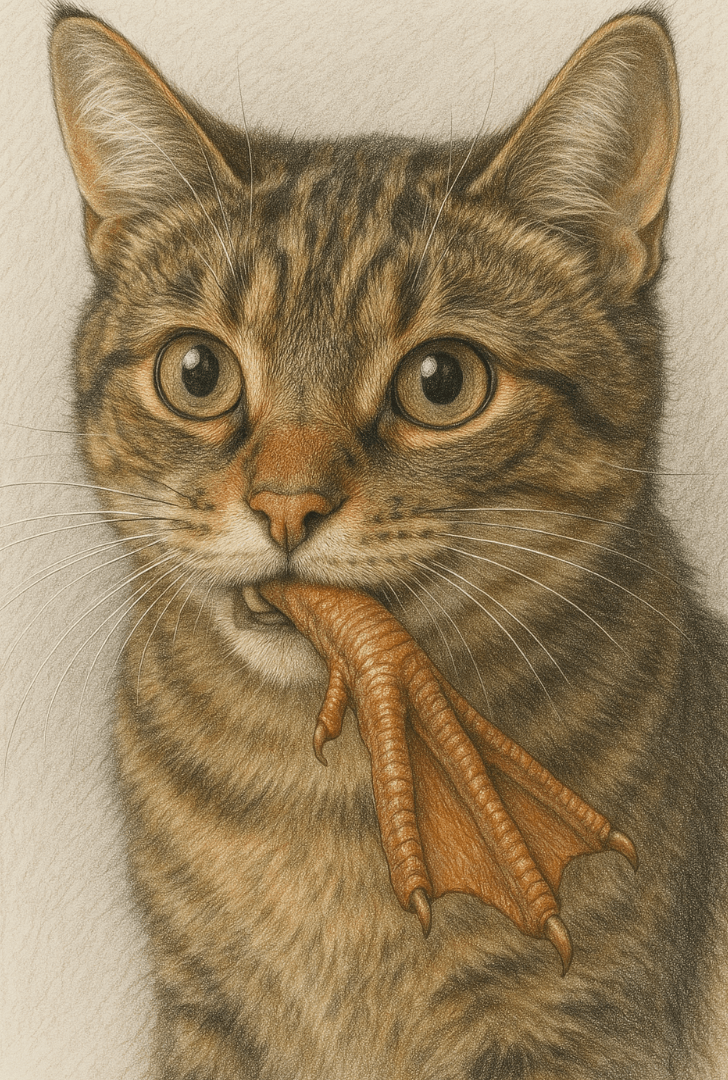Can Cats Eat Duck Feet?
Cats are curious creatures, and their dietary habits often leave pet owners wondering what’s safe for them to eat. One question that frequently arises is whether cats can eat duck feet. While duck feet might seem like an unusual treat, they offer potential nutritional benefits when prepared correctly. However, it’s essential to understand the risks and proper preparation methods before introducing them to your feline friend. In this blog post, we’ll explore everything you need to know about feeding duck feet to cats, from their advantages to potential hazards, ensuring your cat stays healthy and happy.
Benefits of Feeding Duck Feet to Cats
Duck feet can be a nutritious addition to your cat’s diet if handled properly. These benefits stem from the natural composition of duck feet, which aligns well with a cat’s carnivorous needs.
Rich in Collagen:
Duck feet are packed with collagen, which supports joint health and promotes healthy skin and coat in cats.High Protein Content:
As obligate carnivores, cats thrive on protein-rich foods, and duck feet provide an excellent source of lean protein.Natural Source of Glucosamine:
Glucosamine found in duck feet aids in maintaining cartilage health, which is especially beneficial for older or arthritic cats.Low in Fat:
Compared to other animal parts, duck feet are relatively low in fat, making them a healthier option for weight-conscious pets.Satisfies Chewing Instincts:
The texture of duck feet satisfies a cat’s natural urge to chew, providing mental stimulation and dental benefits.
These advantages make duck feet a worthwhile consideration for pet owners looking to diversify their cat’s diet.
Potential Risks of Feeding Duck Feet to Cats
While duck feet can be beneficial, they also come with certain risks that must be addressed to ensure your cat’s safety. Being aware of these hazards allows you to take preventive measures.
Choking Hazards:
Small bones or fragments can pose a choking risk if not properly prepared or supervised during consumption.Sharp Bone Splinters:
Improperly cooked or raw duck feet may contain sharp splinters that could damage your cat’s mouth or digestive tract.Bacterial Contamination:
Raw duck feet may carry harmful bacteria like Salmonella or E. coli, which can sicken both your cat and household members.Overconsumption Issues:
Feeding too many duck feet can upset your cat’s digestive system or lead to nutrient imbalances over time.Allergic Reactions:
Some cats may have sensitivities or allergies to duck meat, resulting in symptoms like vomiting or diarrhea.
By understanding these risks, you can make informed decisions about whether duck feet are suitable for your cat.
Check this guide 👉Can Cats Eat Croutons? Best 7 Expert Tips!
Check this guide 👉Can Cats Eat Bone Marrow? Best 7 Expert Tips!
Check this guide 👉Can Cats Eat Truffles? Best 7 Expert Tips!

Safe Preparation Tips for Duck Feet | Risks of Improper Handling |
|---|---|
Cook thoroughly to soften bones | Raw duck feet may harbor bacteria |
Remove small, sharp bone fragments | Sharp splinters can cause injuries |
Feed in moderation as an occasional treat | Overfeeding can lead to digestive issues |
Supervise your cat while eating | Unsupervised chewing may result in choking |
Consult your vet before introducing new foods | Allergies or sensitivities may arise |
How to Safely Prepare Duck Feet for Your Cat
Proper preparation is key to minimizing risks and maximizing the benefits of feeding duck feet to your cat. Follow these steps to ensure a safe and enjoyable experience.
Choose High-Quality Duck Feet:
Purchase fresh or frozen duck feet from reputable sources to avoid contamination or poor-quality products.Cook Thoroughly:
Boil or bake duck feet until they’re soft enough to chew easily, reducing the risk of choking or injury.Inspect for Sharp Fragments:
After cooking, carefully check for any remaining sharp bones or splinters before offering them to your cat.Serve in Moderation:
Limit duck feet to occasional treats rather than regular meals to maintain a balanced diet.Supervise Consumption:
Always monitor your cat while they’re eating duck feet to prevent accidents or swallowing large pieces.
By following these guidelines, you can ensure your cat enjoys duck feet safely without compromising their health.
Signs Your Cat May Have an Issue After Eating Duck Feet
Even with precautions, complications can arise if your cat consumes duck feet improperly. Watch for these warning signs to act quickly if something goes wrong.
Vomiting or Diarrhea:
These symptoms may indicate gastrointestinal distress caused by indigestible bone fragments or bacterial contamination.Excessive Drooling:
Drooling could signal irritation or injury caused by sharp bone splinters in the mouth or throat.Difficulty Eating:
If your cat avoids food or seems reluctant to chew, they may have injured their teeth or gums.Lethargy or Discomfort:
A sudden lack of energy or signs of pain might suggest internal injuries from swallowed bone fragments.Pawing at the Mouth:
This behavior often indicates that your cat is experiencing discomfort or has a foreign object stuck in their mouth.
Recognizing these signs early allows you to seek veterinary care promptly, preventing further complications.
Common Mistakes to Avoid When Feeding Duck Feet
Feeding duck feet requires attention to detail to avoid mistakes that could endanger your cat’s health. Here are some pitfalls to watch out for.
Feeding Raw Duck Feet:
Raw duck feet carry bacteria and sharp splinters, posing significant risks to your cat’s health.Overlooking Bone Fragments:
Failing to inspect duck feet for sharp pieces can lead to choking or internal injuries.Leaving Cats Unsupervised:
Unattended cats may swallow large chunks or choke on bone fragments, making supervision essential.Overfeeding Duck Feet:
Too many duck feet can upset your cat’s digestion and unbalance their diet.Neglecting Veterinary Advice:
Skipping a professional opinion can result in unknowingly harming your cat with inappropriate portions or preparation methods.
Avoiding these mistakes ensures a safer and healthier experience for your cat.
Nutritional Breakdown of Duck Feet for Cats
Understanding the nutritional value of duck feet helps explain why they can be a beneficial treat for cats. Here’s a breakdown of what makes duck feet a valuable addition to their diet.
Collagen for Joint Health:
Collagen supports cartilage repair and reduces inflammation, benefiting older or active cats.Lean Protein for Muscle Growth:
Duck feet are high in protein, which supports muscle development and overall vitality.Glucosamine for Mobility:
This compound aids in maintaining joint flexibility and reducing arthritis symptoms.Low-Calorie Option:
Duck feet are low in calories, making them a guilt-free treat for weight management.Essential Nutrients:
They contain trace minerals like zinc and selenium, which contribute to immune function and overall health.
This nutritional profile highlights why duck feet can be a wholesome addition to your cat’s diet when fed responsibly.
Alternatives to Duck Feet for Cats
If you’re hesitant about feeding duck feet, there are plenty of alternatives that offer similar benefits without the associated risks.
Cooked Chicken Necks:
Soft and easy to chew, chicken necks provide a rich source of collagen and protein.Freeze-Dried Meat Treats:
These treats are convenient, safe, and packed with nutrients your cat craves.Dental Chews Designed for Cats:
Specially formulated chews clean teeth and satisfy chewing instincts without the risk of choking.Bone Broth (Strained and Unsweetened):
Strained bone broth offers collagen and nutrients found in bones without the hazards of solid fragments.Soft Edible Chew Toys:
Designed for cats, these toys promote dental health and are easy to digest.
These alternatives allow you to cater to your cat’s instincts while keeping them safe.
Frequently Asked Questions About Feeding Duck Feet to Cats
Are raw duck feet safe for cats?
No, raw duck feet can harbor harmful bacteria and sharp splinters; always cook them thoroughly before serving.
How often can I feed my cat duck feet?
Duck feet should be given as an occasional treat, no more than once or twice a week, to avoid digestive issues.
Can kittens eat duck feet?
Kittens should avoid duck feet due to their smaller size and developing teeth, which are more vulnerable to damage.
What are safer alternatives to duck feet?
Cooked chicken cartilage, freeze-dried meat treats, or dental chews designed for cats are safer options.
What should I do if my cat swallows a bone fragment?
Contact your veterinarian immediately to assess the situation and prevent potential complications.
Prioritizing Your Cat’s Safety When Feeding Duck Feet
Feeding duck feet to your cat can provide nutritional benefits, but it’s crucial to prioritize their safety above all else. By understanding the potential risks, preparing duck feet properly, and monitoring your cat closely, you can minimize hazards and ensure a positive experience. Remember, your feline friend relies on you to make the best dietary choices for them—so always err on the side of caution. With careful planning, duck feet can become a tasty and nutritious addition to your cat’s diet, keeping them healthy and satisfied.
Do Cats Have Taste Buds? Best 7 Expert Tips! – Discover how cats experience flavors and why their taste is so unique.
Do Dogs Have Taste Buds? Best 7 Expert Tips! – Discover how dogs experience taste, their preferences, and what it means for their diet and health.
Can Cats Taste Sweet? Best 7 Expert Tips! – Discover why cats can’t taste sweetness, how it affects their diet, and tips to keep them healthy and happy.
Can Dogs Taste Sweet? Best 7 Expert Tips! – Discover how dogs perceive sweetness, which foods are safe, and tips to manage their sweet cravings responsibly.





